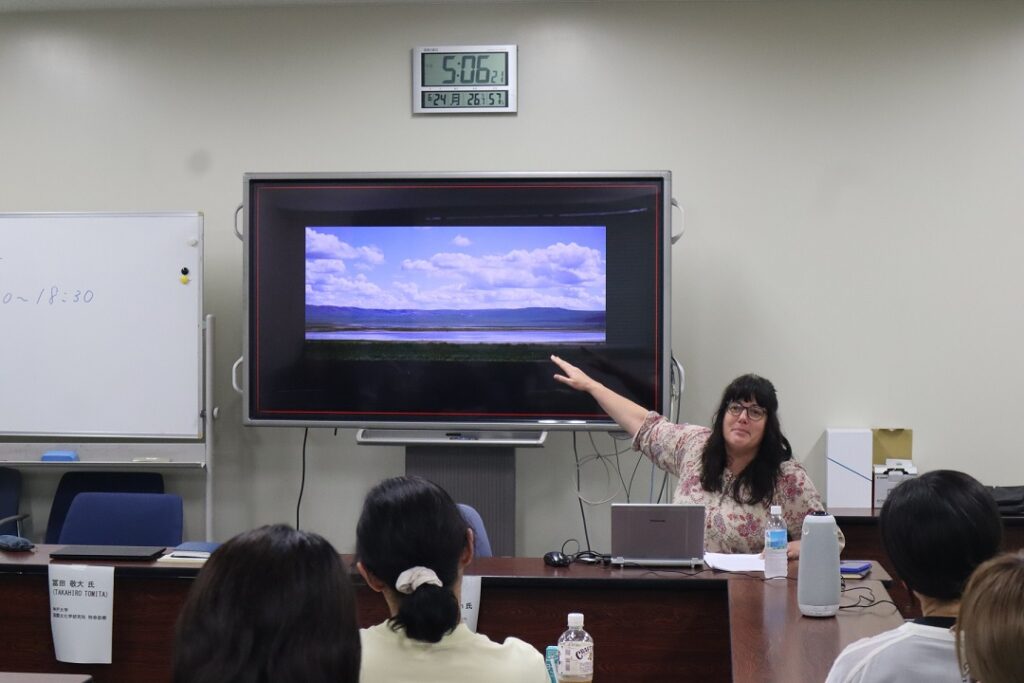Spring Seminar and Meeting with Natasha Fijn in Kobe
Written by Takahiro Tomita
From 24th to 25th June 2024, the seminar ‘Multispecies Influenza: An Environmental Humanities Approach to Zoonotic Disease’ was held at Kobe University. Dr Natasha Fijn, Associate Professor at the Australian National University and Director of its Mongolian Institute, was the featured speaker. We had some concerns about how many people would attend the seminar, as it was being held on a Monday evening at the start of the week. As it turned out, there were around 40 participants from Japan and overseas, including PPIA members. It was a very fruitful and intensive seminar.

On the seminar’s first day, Fijn presented the interim results of her research on ‘A Multispecies Anthropological Approach to Influenza’. This was awarded a mid-career ARC Future Fellowship in 2022. Influenza-type viruses pose a considerable threat to humanity and other mammalian species, particularly those on the brink of extinction in the Anthropocene. Through the mobility of mammals (including humans) and birds, new and emerging forms of influenza have spread rapidly around the world. They have crossed species barriers, infecting animals as wide ranging as waterfowl, equines, felines and canines. However, Fijn points out that previous scientific research on influenza viruses has not sufficiently examined the socio-ecological interconnections between different species. What has largely been missing from the zoonoses-related literature are the preventative practices among local communities. Mongolia is an important case study for zoonotic disease. The predominant mobile pastoral lifestyle provides a wealth of practical experience relating to domestic and wild animals amidst extreme climatic conditions. It also exposes herding families to deadly diseases that cross the species barrier as zoonoses. For example, in 2005 and 2009, avian influenza broke out in Mongolia. This was because a new strain of avian influenza virus, which had spread to overcrowded poultry farms in China, was diffused around the world via migratory birds. Fijn emphasises the need to take a multi-scalar approach for problems surrounding the influenza viruses. In other words, It is necessary to clarify a local holistic approach to prevention and treatment for multiple species struck by Influenza, based on environmental humanities research. During the Q&A session, Fijn and the participants discussed how to scientifically approach zoonotic diseases that spread across borders. They also discussed the impact of climate change on the mutation of avian influenza, and the relationship between the government and local residents regarding infectious diseases countermeasures.



On the meeting’s second day, Fijn and PPIA members met in person and online. The hybrid, free exchange of research ideas and topics discussed future collaboration. After a brief introduction to the PPIA project by Takahiro Ozaki, members including Ariell Ahearn, Troy Sternberg, Zalina Enikeeva, Akira Kamimura, Buho Hoshino, Takahiro Tomita, Moe Terao, Chieko Hirota and Ozaki introduced their PPIA research topics. Future challenges and a free exchange of ideas from different academic fields followed. At the meeting, they also shared information about the Oxford Desert Conference to be held in March 2025 and the International Union of Anthropological and Ethnological Sciences World Congress. We promised to meet again at one of these conferences.
Fijn’s unique and interesting report on the multi-scale relationships between humans, animals and influenza viruses was insightful for our PPIA project on the social and economic impacts of Covid-19 in Inner Asia. The links between the UK, Japan, Mongolia and Kyrgyzstan through the PPIA project were further extended to Australia through this seminar and meeting.

No responses yet